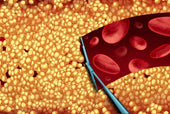Did you know that cholesterol is like a silent friend of our body – it is necessary for well-being, but it causes us problems when there is too much of it? For many, this word is associated with risks and health problems, but, in fact, cholesterol is necessary for every cell in our body. It is like a coin with two sides – one of them helps us produce vital hormones, the other can harm our health if we lose control. So how do we maintain balance? How to normalize blood cholesterol levels by adjusting our diet and other means? Agnė Misiūtė, a family doctor at the ID CLINIC medical center, answers these and other questions.
Vital, but can become dangerous
Cholesterol is a companion of our body that performs many vital functions, but it can also become the cause of serious health problems if its amount increases above normal limits. According to doctor A. Misiūtė, cholesterol is necessary for us and important in areas such as vitamin D synthesis, brain activity and hormone production. However, as the doctor warns, it can also become an enemy of health.
" Most people know the word "cholesterol" as a curse word. However, it is a fat that we all need, it is important for many processes occurring in the body. Cholesterol is necessary for the synthesis of vitamin D, bile acid metabolism, brain function and, of course, the production of hormones. The biggest problem with cholesterol is that it tends to accumulate, which is why people often have more of it in their blood than normal. The problem occurs when it begins to accumulate in the walls of blood vessels. Then we have cardiovascular diseases, complications such as strokes, heart attacks, etc. But the beginning of all problems occurs not because cholesterol circulates in our blood, but because inflammatory processes begin in the walls of blood vessels. Then the endothelium, the inner surface of blood vessels, is damaged and low-density lipoproteins begin to narrow the lumen of blood vessels," says the ID CLINIC family doctor.
The biggest influence is poor nutrition
According to A. Misiūtė, one of the main reasons why cholesterol levels can increase is improper nutrition. According to her, many problems are caused by trans fats, which we get from consuming various convenience foods.
"One of the most influential factors that increases cholesterol levels is poor nutrition. The biggest problems are caused by trans fats, also known as processed fats. These are used in semi-finished products - they are rich in palm, olive palm oil and other compounds that are not natural to humans. Of course, excessive consumption of sweet products is also not good. You should not consume a lot of fast carbohydrates, which suddenly increase your sugar level, or various sweets, desserts, cakes, which we love to enjoy with a cup of coffee or during holidays. Sugar levels can also be increased by non-sweet products, for example, the sugar in various sauces, such as ketchup or mayonnaise. Another reason for increasing cholesterol is stress. During stress, the hormonal system is activated, which encourages us to fight - "A person prepares to overcome serious challenges and this requires energy. So what does our body do? It sends sugar reserves into our bloodstream that we do not use. And then it creates molecules from it that accumulate on the thighs, belly, waist, and in the worst case, on the walls of our blood vessels," A. Misiūtė shares the reasons that increase cholesterol levels.
As the doctor adds, genetics also affect cholesterol levels, but, according to her, a genetic predisposition is not an excuse - a person with a genetic predisposition should take even more care of their health.
"Sometimes people tend to blame all their cholesterol problems on genetics. They say, everyone in my family has high cholesterol. Yes, it definitely has an impact, but this is not a reason not to try and live any way, just because there is a genetic predisposition to high cholesterol. A person should take more care of their overall health," says the doctor at the ID CLINIC medical center.
Some fruits should be eaten as dessert
For those who want to successfully regulate blood cholesterol levels, A. Misiūtė recommends including more fruits, vegetables, berries, and products containing omega-3 acids in their daily diet.
Omega- 3 reduces the level of “ bad” cholesterol , which means that you should eat more fish. People often also have an increased LDL (low-density lipoprotein) index, and fiber, both soluble and insoluble, reduces it best. Insoluble fiber generally helps the digestive system to remove unnecessary substances, while soluble fiber binds excess insulin and cholesterol. Including fruits, vegetables, and berries in the diet also helps a lot. Speaking of berries, special attention should be paid to blue berries, because they are very rich in antioxidants and polyphenols,” says A. Misiūtė.
However, the family doctor adds that certain fruits should be consumed as dessert, as they raise blood sugar levels very quickly.
"Sweet fruits such as bananas, mangoes, and grapes raise blood sugar levels very quickly, so you should treat such products as dessert. You can definitely eat them, you should even include them in your diet, because they are rich in vitamins, but no matter how useful they are, they should be consumed after the main meal so that the sugar does not rise so suddenly," advises a doctor working at ID CLINIC.
When it comes to vegetables, A. Misiūtė emphasizes that no matter which ones we consume, it is much more important to consider how they are prepared.
"It doesn't matter what the vegetable is, what matters is how it's prepared. If it's overcooked, overcooked, mushy, and there's nothing left of it, it means that there's not much left of its beneficial substances. Yes, there will still be some fiber, but the vitamins and minerals have already been broken down. So if you're boiling carrots, sweet potatoes, or other vegetables, don't overcook them, because then their energy and nutritional value will decrease significantly. I would also strongly encourage people to eat what grows in the garden, locally, that doesn't need a lot of chemicals to withstand the journey to Lithuania. The same apple from our garden will be many times better and more useful than the sweetest and tastiest mango flown in from Mexico," the family doctor shares her thoughts.
Fiber-rich foods should be included in the diet.
The specialist mentions that it is very useful to practice a rainbow diet - this means that our plates should contain as many different colored products as possible.
"Fiber is very important for intestinal function, helping to remove accumulated toxins, excess sugar, and cholesterol. So, by not eating vegetables, fruits, and berries, a person deprives themselves of the opportunity to feel good and be healthy. Naturally, we should get fiber with food - we would like to see a colorful rainbow on everyone's plate. There should be all colors: red tomatoes, orange sweet potatoes or carrots, yellow corn, etc. When we get enough colors, we also get enough fiber. We should eat fiber-rich products at least five times a day. This is quite a lot, and certainly not all people eat that much, which is why we have digestive imbalances, increased cholesterol, sugar metabolism disorders, and obesity," says A. Misiūtė.
Fiber deficiency can be easily compensated if the food intake is insufficient. There are many fiber options available on the market, one of which is the special “fruttberry +fiber” mixtures. They contain Natural ingredients – plantain seed husks, agave inulin – contribute to maintaining normal blood sugar and cholesterol levels. Such products are a convenient choice for people who find it difficult to consume the recommended amount of fruits, vegetables and other fiber-rich foods.
It is important not to forget about physical activity
A. Misiūtė emphasizes that in order to effectively regulate cholesterol levels, it is important not only to eat properly, but also to remember other factors of a healthy lifestyle.
"In order to maintain normal cholesterol levels in the body, it is important to understand that the whole is very important. Both quality sleep, physical activity, and fluid intake are necessary. But if we were to break everything down into steps, we should start with what is easy to implement. First of all, we should drink enough water during the day. Then we will not have such a voracious appetite, because sometimes a person feels hungry, although in fact he just lacks water. How do you know how much water you need to drink per day? You just need to multiply 30 ml by your body weight in kilograms. The second thing is that regardless of what you eat, I highly recommend including a plate of salad in your diet. If that salad also had apple cider vinegar, it would be a big plus. The third thing is that if you have eaten a very filling meal, or maybe you have eaten something not very useful, and you are thinking about what to do to make your body feel better - go for a walk, move your leg muscles. Physical activity can be as simple as walking three laps around the house, having a dog can help a lot. And the last step, which can be added to these three things, I would recommend including omega- 3 supplements and fiber -rich products in your diet – vegetables, fruits, berries. By implementing all these points, you can expect to successfully reduce your cholesterol levels,” summarizes family doctor A. Misiūtė.






















